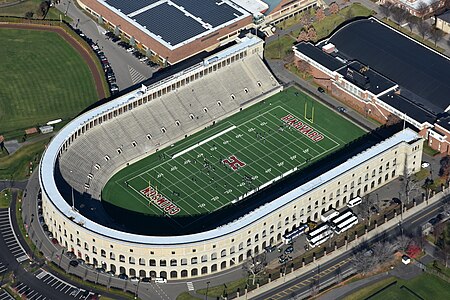Harvard Stadium

Harvard Stadium is a U-shaped college football stadium in the northeast United States, located in the Allston neighborhood of Boston, Massachusetts. The stadium is owned and operated by Harvard University and is home to the Harvard Crimson football program. The stadium's seating capacity is 30,323.Built in 1903, it was a pioneering execution of reinforced concrete in the construction of large structures. Because of its early importance in these areas, and its influence on the design of later stadiums, it was designated a National Historic Landmark in 1987. The stadium is the nation's oldest permanent concrete structure dedicated to intercollegiate athletics. It seated up to 57,166 in the past, as permanent steel stands (completing a straight-sided oval) were installed in the stadium's northeast end zone in 1929. They were torn down after the 1951 season, due to deterioration and reduced attendance. Afterward, there were smaller temporary steel bleachers across the stadium's open end until the building of the Murr Center (which is topped by the new scoreboard) in 1998. Harvard Stadium hosted one Boston Patriots season in 1970. It was their first season in the NFL after the AFL–NFL merger and their last before becoming the New England Patriots. The team moved to Schaefer Stadium in Foxborough the following season.
Excerpt from the Wikipedia article Harvard Stadium (License: CC BY-SA 3.0, Authors, Images).Harvard Stadium
Albert H. Gordon Road, Boston Allston
Geographical coordinates (GPS) Address External links Nearby Places Show on map
Geographical coordinates (GPS)
| Latitude | Longitude |
|---|---|
| N 42.366388888889 ° | E -71.127222222222 ° |
Address
Harvard Stadium
Albert H. Gordon Road
02163 Boston, Allston
Massachusetts, United States
Open on Google Maps








